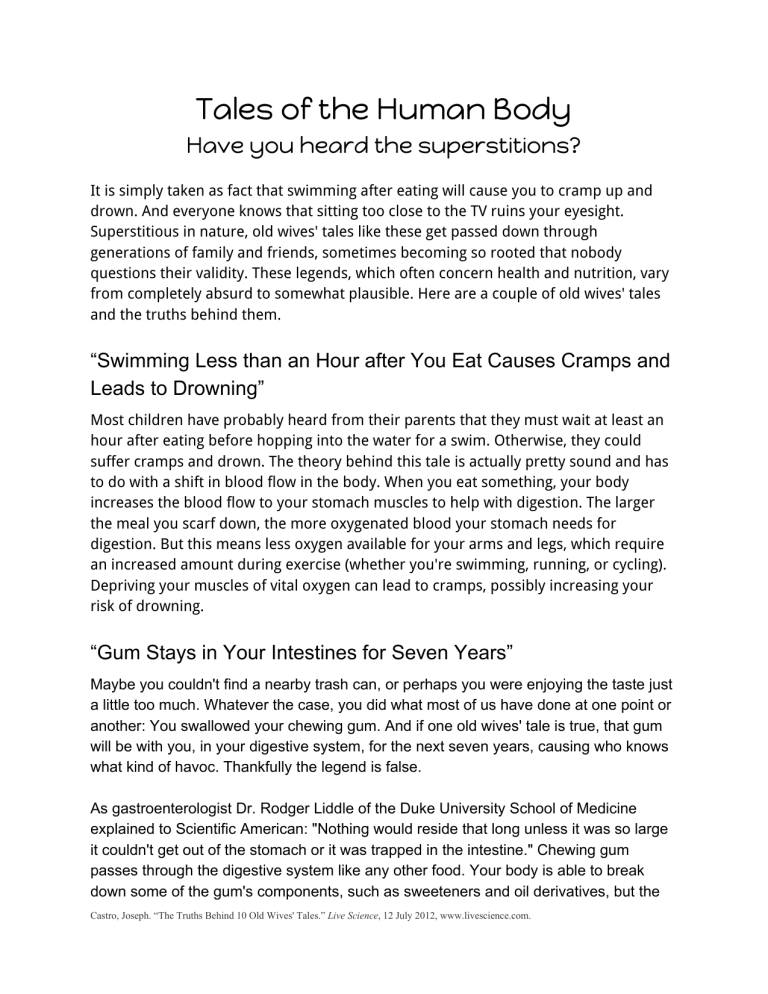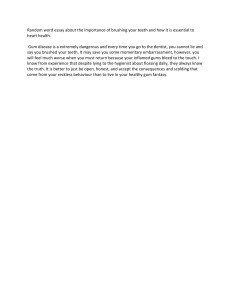
Tales of the Human Body Have you heard the superstitions? It is simply taken as fact that swimming after eating will cause you to cramp up and drown. And everyone knows that sitting too close to the TV ruins your eyesight. Superstitious in nature, old wives' tales like these get passed down through generations of family and friends, sometimes becoming so rooted that nobody questions their validity. These legends, which often concern health and nutrition, vary from completely absurd to somewhat plausible. Here are a couple of old wives' tales and the truths behind them. “Swimming Less than an Hour after You Eat Causes Cramps and Leads to Drowning” Most children have probably heard from their parents that they must wait at least an hour after eating before hopping into the water for a swim. Otherwise, they could suffer cramps and drown. The theory behind this tale is actually pretty sound and has to do with a shift in blood flow in the body. When you eat something, your body increases the blood flow to your stomach muscles to help with digestion. The larger the meal you scarf down, the more oxygenated blood your stomach needs for digestion. But this means less oxygen available for your arms and legs, which require an increased amount during exercise (whether you're swimming, running, or cycling). Depriving your muscles of vital oxygen can lead to cramps, possibly increasing your risk of drowning. “Gum Stays in Your Intestines for Seven Years” Maybe you couldn't find a nearby trash can, or perhaps you were enjoying the taste just a little too much. Whatever the case, you did what most of us have done at one point or another: You swallowed your chewing gum. And if one old wives' tale is true, that gum will be with you, in your digestive system, for the next seven years, causing who knows what kind of havoc. Thankfully the legend is false. As gastroenterologist Dr. Rodger Liddle of the Duke University School of Medicine explained to Scientific American: "Nothing would reside that long unless it was so large it couldn't get out of the stomach or it was trapped in the intestine." Chewing gum passes through the digestive system like any other food. Your body is able to break down some of the gum's components, such as sweeteners and oil derivatives, but the Castro, Joseph. “The Truths Behind 10 Old Wives' Tales.” Live Science, 12 July 2012, www.livescience.com. gum's rubber or latex base gets churned out in a matter of days. However, this doesn't mean you should start swallowing your chewing gum regularly in several reported cases, doctors had to remove taffy like wads of gum from children's bowels. Swallowing a lot of chewing gum in a relatively short amount of time, it seems, can cause the pieces to accumulate and stuff up the digestive tract, causing constipation. Castro, Joseph. “The Truths Behind 10 Old Wives' Tales.” Live Science, 12 July 2012, www.livescience.com.




